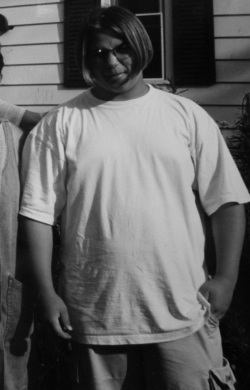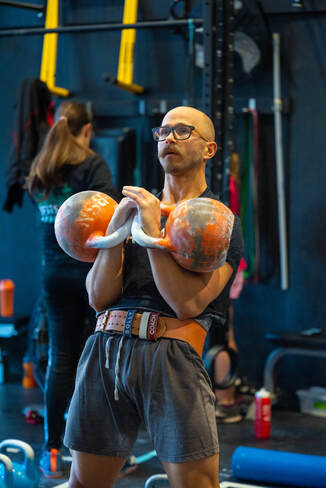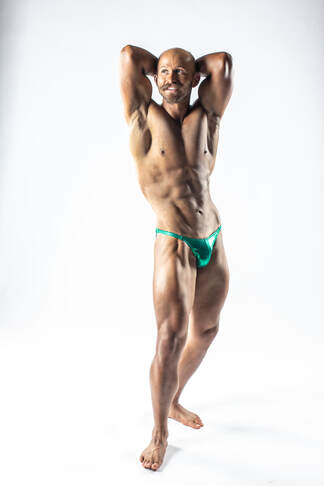Solomon Macys
Owner, coach
 2000-2001
2000-2001
Quick History
I was always a fairly thick individual. Before I began resistance training I'd never had a body-fat percentage below 16%. At my heaviest I was a whopping 228 lbs at age 13. Needless to say I received my fair share of teasing.
In 1999 I moved to London, Ont. to begin my high-school career. In my second year I joined the football team and the wrestling team, where I received MVP honours for both. I also started pumping iron in the school gym most lunch hours and before/after school. With the combination of intense sport conditioning and resistance training I managed to go from 228lbs entering high school (my heaviest) to about 168lbs (my lightest) gradually over 4 years.
During that time training my butt off with weights, football, wrestling, and a dash of rugby - I did indeed take an interest in my diet. As I thumbed through pages of fitness magazines and supplement books I realized that the common threads were eat more protein, eat more fresh fruits and vegetables, and if I wanted to lose fat, to eat less. I think a key component to my successful implementation of these concepts was that I already had a solid foundation of strength & conditioning, which gave function to the food.
Early on I adopted this idea of "functional eating" - that is, eating to serve or support a purpose. It didn't matter if I wanted to build muscle, get faster, get leaner, or just feel better - every morsel played a part. However, you can't just eat protein and get bigger, you can't just cut calories and look "ripped", you can't just take a supplement to run like Usain Bolt. Training drives adaptation, nutrition supports it. Nutrition facilitates good training, and good recovery. Indeed, the most robust correlate to changes in bodyweight is not nutritional habits, but rather changes in physical activity.
I'm sure you've heard, "You can't out-train bad diet", or "Results are 90% nutrition", and lets not forget "Abs are made in the kitchen". Rigidly believing that results are only about food would be just as incorrect as saying that results are only about training.
Both short and long term results depend on so many factors: your basic physical health, sleep duration and quality, non-exercise activity, diet composition and digestion, training frequency-intensity-consistency, injury prevention, skill acquisition, multi-lateral development, food habits and behaviours, emotions and motivations, mental discipline, kitchen skills...
The more you accept yourself for all your strengths, limitations and feelings, commit yourself to personal growth (whatever shape that may take), and take action soon, you may finally find meaning in your physical literacy and break the habits that have held you back.
Live your life, enjoy food, work hard and expect success.
Coach Solly
I was always a fairly thick individual. Before I began resistance training I'd never had a body-fat percentage below 16%. At my heaviest I was a whopping 228 lbs at age 13. Needless to say I received my fair share of teasing.
In 1999 I moved to London, Ont. to begin my high-school career. In my second year I joined the football team and the wrestling team, where I received MVP honours for both. I also started pumping iron in the school gym most lunch hours and before/after school. With the combination of intense sport conditioning and resistance training I managed to go from 228lbs entering high school (my heaviest) to about 168lbs (my lightest) gradually over 4 years.
During that time training my butt off with weights, football, wrestling, and a dash of rugby - I did indeed take an interest in my diet. As I thumbed through pages of fitness magazines and supplement books I realized that the common threads were eat more protein, eat more fresh fruits and vegetables, and if I wanted to lose fat, to eat less. I think a key component to my successful implementation of these concepts was that I already had a solid foundation of strength & conditioning, which gave function to the food.
Early on I adopted this idea of "functional eating" - that is, eating to serve or support a purpose. It didn't matter if I wanted to build muscle, get faster, get leaner, or just feel better - every morsel played a part. However, you can't just eat protein and get bigger, you can't just cut calories and look "ripped", you can't just take a supplement to run like Usain Bolt. Training drives adaptation, nutrition supports it. Nutrition facilitates good training, and good recovery. Indeed, the most robust correlate to changes in bodyweight is not nutritional habits, but rather changes in physical activity.
I'm sure you've heard, "You can't out-train bad diet", or "Results are 90% nutrition", and lets not forget "Abs are made in the kitchen". Rigidly believing that results are only about food would be just as incorrect as saying that results are only about training.
Both short and long term results depend on so many factors: your basic physical health, sleep duration and quality, non-exercise activity, diet composition and digestion, training frequency-intensity-consistency, injury prevention, skill acquisition, multi-lateral development, food habits and behaviours, emotions and motivations, mental discipline, kitchen skills...
The more you accept yourself for all your strengths, limitations and feelings, commit yourself to personal growth (whatever shape that may take), and take action soon, you may finally find meaning in your physical literacy and break the habits that have held you back.
Live your life, enjoy food, work hard and expect success.
Coach Solly
|
ROLES
QUALIFICATIONS
KETTLEBELL SPORT ACHIEVEMENTS
OTHER ACHIEVEMENTS
|
Looking for nutrition or training advice?
If you are looking for guidance on your training, nutrition, or stress reduction, go over to my Personalized Coaching page for more information.



